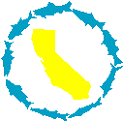CSPA |
| Your 501(c)(3) tax deductible cash donations are desperately needed if the fight for our fisheries is to continue. Read how you can donate! |
 Enter your Email address to sign up Enter your Email address to sign up for our Weekly Newsletter For Email Marketing you can trust |
More News
![]()
 CSPA to Sue El Dorado Irrigation District's Wastewater System for Illegal Sewage Spills and Discharges
CSPA to Sue El Dorado Irrigation District's Wastewater System for Illegal Sewage Spills and Discharges
by Bill Jennings, CSPA Executive Director
October 28, 2009 -- Stockton, CA - The California Sportfishing Protection Alliance (CSPA) today gave formal notice, pursuant to the federal Clean Water Act (CWA), of its intent to sue the El Dorado Irrigation District's (EID) sewage collection and treatment systems serving the communities of Cameron Park, Deer Creek and Motherlode for illegal sewage spills, overflows and discharges to creeks tributary to the Consumes River and thence the Sacramento-San Joaquin Delta. The CWA requires that citizens enforcing the Act must provide a discharger 60 days notice prior to filing the lawsuit. CSPA's letter puts EID on notice that its municipal sanitary sewer collection and treatment system has violated effluent, monitoring and reporting requirements of its wastewater permits and illegally allowed egregious quantities of raw sewage to overflow into city streets and the storm water collection system and thence to local creeks, the Cosumnes River and Delta.
“EID's sewage collection and wastewater treatment system is a public health and environmental hazard,” said CSPA Executive Director Bill Jennings. “The District's failure to provide adequate facilities and acceptable levels of maintenance for wastewater control indicates an outrageous and egregious disregard for the health of area residents and poses a clear threat to the integrity and survival of local creeks, the Cosumnes River and the Delta's fish and wildlife resources,” Jennings observed, adding that, “the spills and effluent violations evidence poor environmental management.”
EID's El Dorado Hills wastewater collection and treatment plant consists of approximately 195.8 miles of sanitary sewer lines serving some 40,000 people and discharges up to 4 million gallons per day (MGD) of treated wastewater to Carson Creek. EID's Deer Creek wastewater collection and treatment system consists of approximately 185.7 miles of sanitary sewer lines serving some 20,000 people and discharges up to 3.6 MGD to Deer Creek. Sewage spills result from poor management and inadequate maintenance. EID's wastewater permits prohibit the discharge of untreated wastes from sanitary sewer spills and overflows and establish specific effluent limits for discharges of treated wastewater to surface waters.
Sewage spills and overflows are serious health and environmental hazards. Untreated sewage can contain numerous dangerous chemical solvents, heavy metals like lead and mercury and wastes that can impair immune and reproductive systems of fish and wildlife. Pathogens in untreated sewage can cause a multitude of illnesses in humans. Local residents may be exposed to these pathogens when recreating or fishing in waterways, as well as when sewage spills into homes, streets, parks, schools and businesses.
A well-run collection system experiences 0 to 3 spills per 100 miles per year and California's median spill rate is about 4 spills per 100 miles. EID's Deer Creek sewer system reported 36.1 spills/100 miles in 2004, 17.8 spills/100 miles in 2005, 24.8 spills/100 miles in 2006. 25.3 spills/100 miles in 2007, 32.8 spills/100 miles in 2008 and through September had 27.4 spills/100 miles in 2009. EID's El Dorado Hills system reported 13.8, 8.2, 9.7, 7.7, 7.2, 11.7 spills/100 miles in 2004, 2005, 2006, 2007, 2008 and 2009, respectively. Information available to CSPA indicates that EID has been underreporting spills from both Deer Creek and El Dorado Hills.
“The Clean Water Act requires strict compliance with pollution discharge permits,” said Mike Lozeau of Lozeau/Drury LLP, one of the attorneys representing CSPA. “This is especially appropriate for sewage spills, any one of which poses a series health hazard to people and wildlife downstream.”
In addition to discharges resulting from spills and overflows, EID has illegally discharged treated effluent exceeding allowable limits for total coliform, total suspended solids, biochemical oxygen demand, ammonia, pH and chlorine residual and violated receiving water limits for temperature, pH and dissolved oxygen. EID's discharge of pollutants and failure to comply with receiving water limitations harms receiving waters and pose serious risk to fisheries, wildlife and the health and recreation of local residents.
Between October 2004 and March 2009, CSPA has documented 423 violations of effluent and receiving water limits, 5 flow violations, 353 monitoring violations and 443 reporting violations for the Deer Creek wastewater treatment plant. During the same period, CSPA has documented at least 289 violations of effluent and receiving water limits, 1,286 monitoring violations and 843 reporting violations for the El Dorado Hills wastewater treatment plant. Additionally, CSPA has documented some 116 illegal spills of reclaimed wastewater to surface waters at both the Deer Creek and El Dorado Hills facilities.
Lozeau/Drury LLP and Lawyers for Clean Water, Inc., are representing CSPA in this matter.